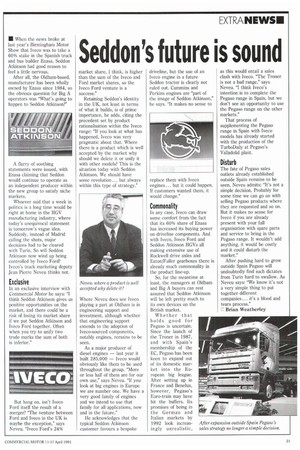Seddon's future is sound
Page 23

If you've noticed an error in this article please click here to report it so we can fix it.
• When the news broke at last year's Birmingham Motor Show that Iveco was to take a 60% stake in the Spanish truck and bus builder Enasa, Seddon Atkinson had good reason to feel a little nervous.
After all, the Oldham-based, manufacturer has been wholly owned by Enasa since 1984, so the obvious question for Big A operators was "What's going to happen to Seddon Atkinson?"
A flurry of soothing statements were issued, with Enasa claiming that Seddon would continue to operate as an independent producer within the new group to satisfy niche markets.
Whoever said that a week in politics is a long time would be right at home in the HGV manufacturing industry, where today's unequivocal statement is tomorrow's vague idea. Suddenly, instead of Madrid calling the shots, major decisions had to be cleared with Turin. So will Seddon Atkinson now wind up being controlled by Iveco Ford? Iveco's truck marketing deputy Jean Pierre Neveu thinks not.
Exclusive
In an exclusive interview with Commercial Motor he says: "I think Seddon Atkinson gives us positive opportunities on the market, and there could be a risk of losing its market share if we put Seddon Atkinson and Iveco Ford together. Often when you try to unify two trade marks the sum of both is inferior."
But hang on, isn't Iveco Ford itself the result of a merger? "The venture between Ford and Iveco in the UK is maybe the exception," says Neveu. "Iveco Ford's 24% market share, I think, is higher than the sum of the Iveco and Ford market shares, so the Iveco Ford venture is a success."
Retaining Seddon's identity in the UK, not least in terms of what it builds, is of prime importance, he adds, citing the precedent set by product rationalisation within the Iveco range: If you look at what has happened, Iveco was very pragmatic about that. Where there is a product which is well accepted by the market why should we delete it or unify it with other models? This is the situation today with Seddon Atkinson. We should have some revolution.., but always within this type of strategy."
Where Neveu does see Iveco playing a part at Oldham is in engineering support and investment, although whether that engineering support extends to the adoption of Iveco-sourced components, notably engines, remains to be seen.
As a major producer of diesel engines — last year it built 285,000 — Iveco would obviously like them to be used throughout the group. "More or less half of them are for our own use," says Neveu. "If you look at big engines in Europe we are number one. We have a very good family of engines and we intend to use that family for all applications, now and in the future," He acknowledges that the typical Seddon Atkinson customer favours a bespoke driveline, but the use of an Iveco engine in a future Seddon tractor is clearly not ruled out. Cummins and Perkins engines are "part of the image of Seddon Atkinson," he says. It makes no sense to In any case, Iveco can draw some comfort from the fact that its 60% share of Enasa has increased its buying power on driveline components. And with Iveco, Iveco Ford and Seddon Atkinson HGVs all making extensive use of Rockwell drive axles and Eaton/Fuller gearboxes there is already much commonality in the product line-up.
So, for the meantime at least, the managers at Oldham and Big A buyers can rest assured that Seddon Atkinson will be left pretty much to its own devices on the British market.
Whether that holds good for Pegaso is uncertain. Since the launch of the Ironer in 1987, and with Spain's membership of the EC, Pegaso has been keen to expand out of its domestic market into the European big league. After setting up in France and Benelux, however, Pegaso's Euro-train may have hit the buffers. Its promises of being in the German and Italian markets by 1992 look increasingly unrealistic, as this would entail a sales clash with Iveco. "The Troner is not a bad range," says Neveu. "I think lveco's intention is to complete the Pegaso range in Spain, but we don't see an opportunity to use the Pegaso range on the other markets."
That process of supplementing the Pegaso range in Spain with Iveco models has already started with the production of the TurboDaily at Pegaso's Valladolid plant.
Disturb
The fate of Pegaso sales outlets already established outside Spain remains to be seen. Neveu admits: "It's not a simple decision. Probably for some time we can go on with selling Pegaso products where they are requested and so on. But it makes no sense for Iveco if you are already present with your full organisation with spare parts and service to bring in the Pegaso range. It wouldn't add anything, it would be costly and it could disturb the market."
After pushing hard to grow outside Spain Pegaso will undoubtedly find such dictates from Turin hard to swallow. As Neveu says: "We know it's not a very simple thing to put together different companies._ it's a blood and tears process."
7 Brian Weatherley
















































































